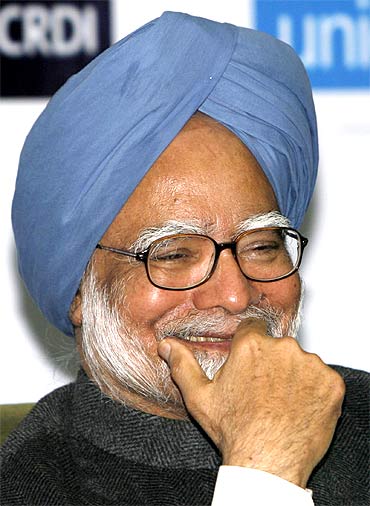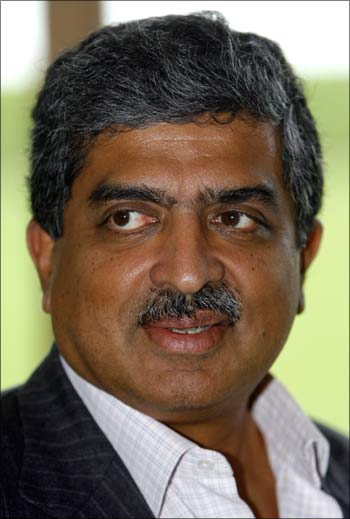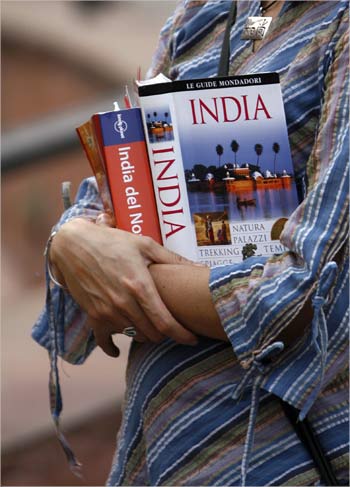Photographs: Rediff Archive
Prime Minister Manmohan Singh said on Thursday that India has overcome the problem of 'brain drain' and is drawing on the global 'brain bank' of people of Indian origin.
"Today, we in India are experiencing the benefits of the reverse flow of income, investment and expertise from the global Indian diaspora," he said at the Hiren Mukherjee Memorial Lecture in Parliament House.
Welcoming the renowned economist Jagdish Bhagwati, who delivered the annual lecture, Singh said that the problem of 'brain drain' has been converted into an opportunity of 'brain gain'.
Delivering the Hiren Mukherjee Memorial annual Parliamentary lecture, Bhagwati said, "It is easy to exaggerate the corruption we have today. In India, public figures are considered to be corrupt unless they prove to you otherwise. A blind man will tell you how he saw 'with his own eyes' a bribe being given and accepted"!
"We are drawing on the global 'brain bank' of people of Indian origin world wide," the prime minister said, adding that Bhagwati was one of the shining stars of that community of global Indians.
. . .
Of India's brain gain & how UID will curb corruption
Image: Prime Minister Manmohan Singh.Photographs: Reuters
Public figures are perceived to be corrupt unless they prove otherwise and it is easy to exaggerate corruption in India, Bhagwati told Indian MPs.
Within days of Bihar voters giving a pronounced victory to Nitish Kumar for his development agenda, Bhagwati shared his thoughts on the subject with the Parliamentarians, who need to live up to the rising aspirations.
"Aroused economic aspirations for betterment have led to political demands for politicians to deliver yet more. This suggests that voters will look to vote for the politicians who can deliver growth. . .," he said.
The Columbia University professor, who is the brother of former Chief Justice of India P N Bhagwati, tried to establish a link between development and economic reforms.
"Smart members of the Lok Sabha should be looking to augment reforms, not reverse them as misguided anti-reform critics urge."
. . .
Of India's brain gain & how UID will curb corruption
Photographs: Reuters
He made out a strong case for India opening the retail sector and labour market reforms, arguing they would only help the poor.
"Such intensification and broadening of reforms can only add to the good that these reforms do for the poor and the under-privileged," said the 76-year-old Bhagwati who has taught at Massachusetts Institute of Technology, Oxford University and the Delhi School of Economics.
Talking about the issue of corruption, he said the menace can be dealt with by institutional reforms and use of science.
As an example, he cited the government initiative of giving electronic identity cards to the poor.
"It is wrong to think that we cannot think of institutional reforms that can reduce the corruption we do have. The abolition of the permit raj, of course, eliminated that important source of corruption."
. . .
Of India's brain gain & how UID will curb corruption
Image: Nandan NilekaniPhotographs: Reuters
He said Nandan Nilekani is engaged in "arguably the most important innovative reform in recent years by creating a national database of identity details of Indian citizens".
"This should take the political corruption out of the Public Distribution System and in the Employment Guarantee Scheme, and will also reduce bureaucratic corruption by bypassing the low-level bureaucrats who refuse to give you what you need unless you grease their palms."
He said democracy matters more to the poor than to the rich. Likewise, "economic growth had led to reducing poverty, while it has not increased inequality."
The prime minister said that Bhagwati was among the first to study the phenomenon of 'brain drain' and identify its benefits for the country.
Noting that Bhagwati was among the architects of the World Trade Organisation and continued to guide it, Singh said Bhagwati and his wife were pioneers among economists who questioned the efficacy of the licence-permit control raj.
. . .
Of India's brain gain & how UID will curb corruption
Photographs: Reuters
In his remarks, Vice President Hamid Ansari, apparently referring to the ongoing pandemonium in Parliament, said that founding fathers took great pride in the effective working of Parliament.
"It is in the arena of public debate that one looks back with a sense of nostalgia to the initial years of our Republic," he said.
He said that Bhagwati has addressed the issue of societal inequalities and has argued that any discussion of inequality has to be in a social and political context and can not be an academic or statistical exercise.
"The ambit of the term 'reform' goes beyond correctives to economic activity. To what extent have Indian reforms alleviated poverty and addressed inequality is a subject matter not just for the economists," Ansari said.
Observing that it would also be pertinent to explore the need for fundamental reforms in non-economic contexts, especially in governance, he said, "We can ill afford the economic, social and political cost of not addressing reforms in these contexts."






article